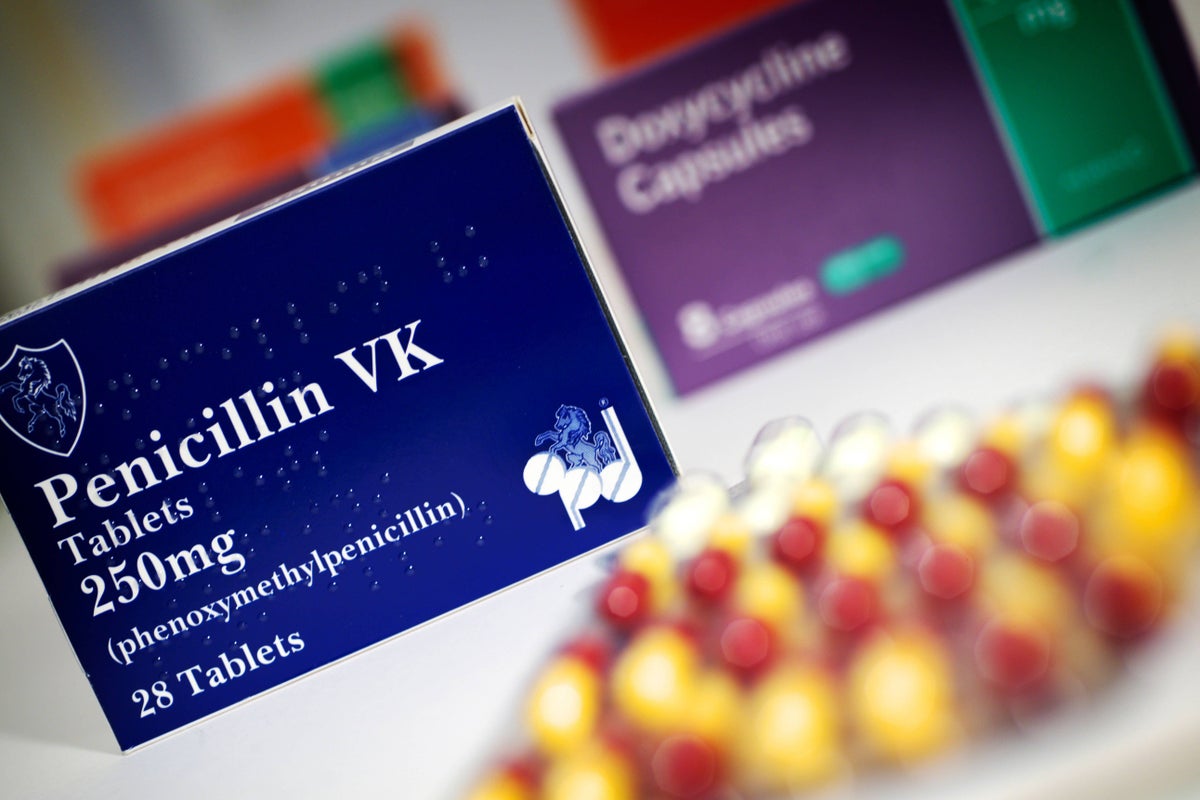
Five times more prescriptions for penicillin are being dished out compared with three weeks ago amid the strep A outbreak, experts have said.
They stressed that there are “plenty” of antibiotics in the country but said some forms of antibiotics could be put on a “shortage protocol” to allow pharmacists to give worried parents alternatives instead of forcing them to traipse to various pharmacies or return to the GP to ask for a new prescription.
Meanwhile the UK Health Security Agency (UKHSA) is doing a “deep dive” into severe cases which have resulted in death.
Early data suggests around a third of children may have also had another respiratory virus at the time they were infected with strep A which prompted one expert to encourage parents to take up the offer of the flu vaccine for their child.
Speaking at webinar for clinicians on Strep A, hosted by the Royal Society of Medicine, Professor Susan Hopkins, chief medical adviser at the UKHSA, said: “We’re doing a deep dive into those (cases) that have been more severely unwell at the moment.
“We do know that, for example, that about a third of the invasive cases have added another respiratory virus detected at the same time.
“So that gives us a clue that perhaps the co-infection with respiratory viruses means the bacteria are more likely to go into the lungs … but really that’s speculation at the moment.”
It's important to support as many children and adults as possible to get their flu vaccine as we head into winter— Dr Elizabeth Whittaker
Dr Elizabeth Whittaker, senior clinical lecturer in paediatric infectious diseases at Imperial College London, said that flu is “quite strongly associated with group A strep” adding: “So it’s important to support as many children and adults as possible to get their flu vaccine as we head into winter.”
On antibiotics, Dr Hopkins added: “We went into this having plenty of antibiotics. I’ve been told in the last few days that we’re using five times more penicillin than we were using three weeks ago.
“And clearly our supplies and stocks won’t last that long if we keep using that volume.
“We always have a few weeks of stock and in reserve but not months and so getting more stock out is critical.
“And of course anywhere there’s high supply and demand – you’ll know this from your toilet rolls in your local supermarkets times in the past – that it may run out of stock, but there’s more in the warehouses.”
Adam Finn, professor of paediatrics at the University of Bristol, said: “There is an abundance of antibiotics that one can use in addition to treat this particular infection.
“So there’s absolutely zero risk that seriously ill children will be in a position where they can’t be treated. That’s just not going to happen.”
Asked if pharmacists could provide alternatives if they didn’t have the antibiotic prescribed in stock, Prof Hopkins added: “That requires what I think is called a severe shortage protocol to be introduced and I believe they’re on the way if they’re not there already, to allow people to use different formulations of the same.
“And we’ll continue to review that at a national level, working with the Department of Health, to define what are the antibiotics pharmacists can prescribe as an alternative if they’ve not got any stock.
“Advice for GPs out there is that you can crush the penicillin tablets and they can be taken really easily. With a little bit of jelly or with a bit of food.”
She added that there are “much more tablets available” than the liquid form of the drug which is more commonly prescribed for children.
Dr Whittaker said that peanut butter, chocolate spread or honey were a good alternative to mix crushed tablets in.
Experts also urged parents to be vigilant for signs of deterioration among children.
Dr Whittaker added: “This is about the recognition of the unwell child regardless of whether this is caused by a group A strep, or meningococcal, or any of the other things that can make the child severely unwell.
“It’s making sure the messaging about when to really worry is clear, and that people know how to access support.
“And so it’s breathing fast, tachycardic (a fast heart rate), lethargic etc, that’s when people need to seek medical attention.”
She added: “I think it’s probably the most important thing that healthcare professionals who have seen children at the moment are doing is to say to parents ‘while they’re fine at the moment, they can get sick very quickly and please come back if they deteriorate’.
“Slightly the worry about giving antibiotics very easily is that parents will then think that that’s all going to be OK, we have to make sure that they understand that they can still get sick on antibiotics and to come back if they’re worried.”
Prof Finn added: “Helping (parents) recognise that if things do deteriorate, they need to come back, is almost certainly the key to try to avoid these cases where we see these deaths.”
Asked about Christmas interactions with older relatives, Prof Hopkins added: “If you’ve got a sick child, be careful around Granny. I think that’s normal for any infectious disease rather than worrying particularly about which one it is.”







